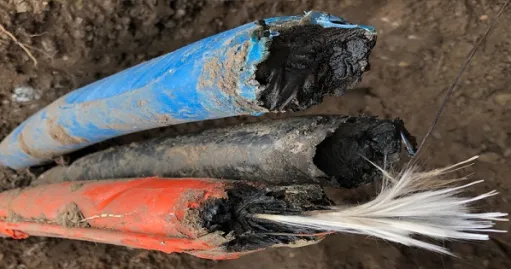The Federal Government of Nigeria is taking a significant step to protect broadband fibre lines and prevent the loss of revenue for telecommunications companies, such as MTN Nigeria Communications Plc.
In response to frequent complaints of financial losses due to fibre line destruction, the Federal Ministry of Works is drafting a new rule that will soon be signed into law as an executive order by President Bola Tinubu.
Nigeria regulates fibre lines damage
The new regulation aims to address the issue of vandalism and provide stricter oversight of construction companies, ensuring they adhere to guidelines that safeguard broadband fibre lines during federal road construction projects. This move not only helps maintain the integrity of the country’s telecommunications infrastructure but also supports the growth and development of the sector.
Read also: Africa’s submarine cables undergo changes, shapes connectivity
The Nigerian government’s decision to strengthen regulations against fibre line destruction reflects its commitment to fostering a conducive environment for telecommunications companies to thrive. This initiative is expected to contribute positively to the nation’s digital transformation and economic growth.
“Telecom assets are critical backbone that supports the economy across sectors,” a senior presidential aide said. He also said that the Association of Telecommunications Companies has been asking for this classification for years. “Further assurance that the Nigerian government will protect their investments against vandals and criminal elements” will come from the new rules.
According to the Nigerian Communications Commission, the sector is expected to contribute more than 15% of the country’s GDP by the end of 2027, up from 13.5% in the third quarter of last year.
Relieving Nigeria’s telecoms industry
As a result of the sharp drop in the value of currency and the tripling of energy prices, the telecoms industry will feel less pressure on their sales and operating costs.
It is estimated that damaged cables cost the business almost 27 billion naira ($23 million) in repairs and lost revenue last year alone. The papers show that in Africa’s most populous country, MTN Nigeria is the most extensive wireless operator, and Airtel Africa Plc paid the most.
The records show that MTN’s fibre line was cut over 6,000 times last year. On February 28, customers lost data and voice service for more than five hours because of problems with the network caused by a road building company, an oil service company, and someone burning trash in a manhole.
Read also: Omnispace, MTN to expand mobile connectivity across Africa
In 2022 and 2023, the operator moved 2,500 kilometres (1,553 miles) of weak fibre cables. It cost more than 11 billion naira, enough to build 870 kilometres of new fibre lines to cover places that didn’t have them before.
The head of the Association of Telecommunications Companies of Nigeria, Tony Izuagbe Emoekpere, said a presidential order on the subject would be good.
“Our communication networks can be destroyed whenever they want,” he said. “We are eagerly awaiting the president’s order.” “It would be great for the industry and make people want to invest.”














